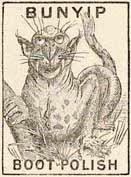BEING a principled Bunyip can have its downside. Make a promise to be somewhere and do something and, much as circumstances might change in the interim, the obligation to turn up and perform as promised cannot be shrugged off. That is why tomorrow morning will see The Professor on the first tee at Imperial Bearbrass, where Double Bogey Daddy needs someone with a reliable short game to compliment his long drives in a very social Ambrose event. Unless it buckets down, always a possibility (fingers crossed) in Melbourne, there will be no getting out of it.
What a pity! It would be much more interesting to secure a seat in the Marsh Auditorium at 555 Londsdale Street and witness the inaugural public hearing of the Independent Inquiry into Media and Media Regulation.
It should be a great show, perhaps the finest display of partisan politics and naked self-interest ever to be gussied up with a retired judge and pointed at the public purse. Start with the very first witness, Dr Martin Hirst, who will be introduced, to quote his bio, as “associate professor and journalism curriculum leader in the School of Communication and Creative Arts at Deakin University.”
That is not Hirst’s most notable distinction, however. As is thumbnailed on the bio page of the archival website Marxist Interventions, the inquiry’s first source of wisdom “has been active in socialist politics since 1975 and claims to have been the only Trotskyist to ever work in the federal press gallery as a journalist.”
No mere scribbler or teacher of aspiring scribblers, Hirst is the real, revolutionary deal, as one of his fellow Trots commented after a June, 2007, demonstration outside the Australian High Commission in Auckland, where he was teaching at the time. The grievance was John Howard’s intervention in the Northern Territory’s troubled Indigenous communities, which the trans-Tasman ferals saw – Surprise! Surprise! -- as racist neo-imperialism. It was a rough and tumble gathering, with at least one arrest for assaulting police, the rioters egged on by Hirst, as a comrade on the barricades explained:
...very good speeches from all the groups in support-Julia and Joe from Socialist Worker, Martin Hirst, Lecturer in Media studies at AUT, Jared from Workers Party, Jim Gladwin from Citizens against Privatisation, and statement read out from Kulin Nations and Aboriginal declaration of sovereignty’ by UNITY editor Daph Lawless in Consulate occupation that broke through police lines.
Yes, it would be fun to attend tomorrow’s hearing, not least because the witnesses get even better after that.
More on the other stars of the show a little later in the day.
UPDATE: If you fancy a little preview of Hirst's likely theme, go here, where he has just posted a little essay about Andrew Bolt, the Mordy-Litijus tribe and why free speech is acceptable only so long as people like Hirst find its sentiments congenial:
Trots, as everyone knows, go out of their way not to give offence.
UPDATE II: While he approves of gagging free speech he finds unpleasant, Hirst squeals when he perceives the same motoives in others. Listen closely from the 3:00 mark, when Hirst accuses the U.S. of "trying to shut me up" for disagreeing with its campaign against terror and terrorists.
UPDATE: If you fancy a little preview of Hirst's likely theme, go here, where he has just posted a little essay about Andrew Bolt, the Mordy-Litijus tribe and why free speech is acceptable only so long as people like Hirst find its sentiments congenial:
The Herald &Weekly Times justification on this point seems to imp[ly that anything goes in the freedom of speech stakes . . . This argument takes no account of the public benefit and public interest in having a legal means to curtail hateful, hurtful and inflammatory propaganda."
Trots, as everyone knows, go out of their way not to give offence.
UPDATE II: While he approves of gagging free speech he finds unpleasant, Hirst squeals when he perceives the same motoives in others. Listen closely from the 3:00 mark, when Hirst accuses the U.S. of "trying to shut me up" for disagreeing with its campaign against terror and terrorists.

Professor, what is an 'associate professor', what does he or she actually do? I ask because, for example, the ACT in general and the ANU humanities schools in particular, seems to have scores of 'associate professors' and many if not most of them appear to be former middle management public servants with undistinguished backgrounds and achievements, recruited through processes that, to the outsider at least, appear opaque.
ReplyDeleteWould it be inaccurate and unfair to describe some, at least, of 'associate professor' appointments as parachutes for people who are well connected but who haven't quite made it in their initial choice of career? I've no evidence of course, that such a generalisation applies to Mr Hirst.
CP
CP
ReplyDeleteYou may be confusing adjunct professors with associate professors. Adjunct professors are ex bureaucrats who cannot think of much to do except sit behind a desk, and if they are on good terms with a uni may acquire one for that purpose. Mr Hirst, an associate professor, is in old-school language a lecturer who wants to be a professor. By contrast, adjunct professors want for little more than a business card and to be near others like themselves, which could explain their popularity in Canberra.
PC